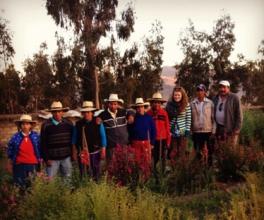 After meeting with OMIL (Organization of Indigenous Women of Laramate) leaders in Lima at the World Conference of Indigenous Women, a declaration they made stuck with me as we drove 10 hours to their mountainous villages: “An informed community is one that progresses.” The communities of Yauca and Patachana are located in the Laramate District of the Ayacucho region, a predominantly indigenous area in the south-central Andes. The Hunger Project and Chirapaq work together in Ayacucho to support leadership development and women’s empowerment through information and economic participation. OMIL members maintain family gardens, manage a dairy production plant, and aspire to live in healthy and sustainable homes.
After meeting with OMIL (Organization of Indigenous Women of Laramate) leaders in Lima at the World Conference of Indigenous Women, a declaration they made stuck with me as we drove 10 hours to their mountainous villages: “An informed community is one that progresses.” The communities of Yauca and Patachana are located in the Laramate District of the Ayacucho region, a predominantly indigenous area in the south-central Andes. The Hunger Project and Chirapaq work together in Ayacucho to support leadership development and women’s empowerment through information and economic participation. OMIL members maintain family gardens, manage a dairy production plant, and aspire to live in healthy and sustainable homes.
OMIL started solely as a women’s committee, but, faced with the loss of their indigenous identity, they confronted discrimination by registering as an indigenous organization. Motivated by the onset of malnutrition they were observing in their children, the Yauca and Patachana women decided to join forces with other mothers in the community to create a different life for their families. No longer dependent on external employment, the women were empowered by their new-found autonomy and overwhelmed with the demand for the healthy crops they were making available to their local market. Prior to starting their gardens, if they didn’t have the money to buy food, they would be forced to go without.
At the end of October, OMIL welcomed me to Yauca and Patachana to share in the successes of their family gardens and dairy production. Since joining OMIL within the past year, the community partners have engaged in technical training on native crop cultivation, and maintained productive, organic, integrated gardens. The well-informed, articulate partners were proud to display the robust state of the crops, and offered their ambitions to become more serious producers to respond to the growing demand for their nutritious organic produce.
The gardens are demonstrating a threefold effect on the communities:
- empowering the women through autonomy and affirming their indigenous identity through native crops,
- diversifying family diets, and
- generating income through market and organic fair sales. They articulated their new-found confidence in participating as citizens, and aspire to higher positions of leadership within their communities.
Family gardening has gained recent attention as a fundamental means to alleviate hunger, reduce social inequality and stimulate rural economic development. Latin American leaders are recognizing the importance of small-scale production, and according to the Santiago Summit Declaration of the Community of Latin American and Caribbean States (CELAC), “the principle cause of hunger is poverty, and that, to overcome it, it is necessary to coordinate actions related to productive inclusion of small-scale family farmers.”
Furthermore, the 66th session of the UN General Assembly declared 2014 as the International Year of Family Farming, aiming to raise the profile essay of family and smallholder farming. The Hunger Project-Mexico is directly engaged with family farming advocacy efforts, having launched the Family Farming Network in Mexico on November 22, 2013, in partnership with FAO and various ministries of the Government of Mexico.
Learn More
- OMIL is part of The Hunger Project and Chirapaq’s Indigenous Women program
- CECLAC article (Spanish language)
- The Hunger Project-Mexico and the family farming network (Spanish language)
